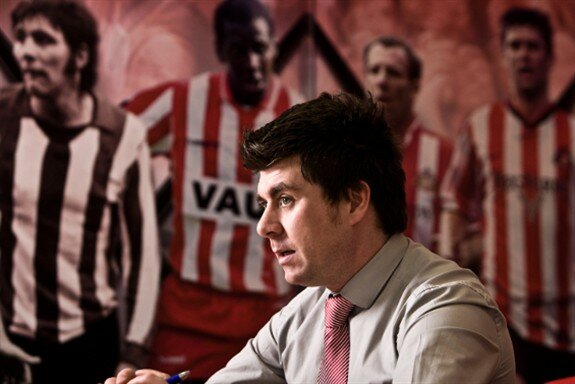
Pitch perfect
Friday 11 May 2012 5:00
Gary Hutchinson shares the story behind Sunderland AFC's transformation into a major pull for the brightest stars of the music world.
Centre circle at The Stadium of Light once had a simple purpose. It was where forwards kicked off again after someone, hopefully Sunderland, had scored.
Now, while the red and white fans will still see it that way, Gary Hutchinson sees it also as a magic circle, where the way is prepared perhaps for an elephant to appear out of nowhere. Or a big clown. A massive man. A waterfall. A fire, even – albeit controlled.
“Logistical challenges is one way of putting it,” he suggests, speaking now of his moneyspinning fulfilment of ambition to diversify his love supreme, Sunderland AFC and its stadium, far beyond its core activity of Premiership football.
An ex-waiter recently appointed to the club board as commercial director, he now builds the club’s and ground’s reputation also as an open-air concert venue and events organiser.
It’s maximising assets and building on the city’s growing name as an entertainment venue, Sunderland already being host to Europe’s largest free international air show.
By the end of this year the stadium will have hosted 12 big-name concerts, and 650,000 music fans in all, in addition to the football spectators, will have packed the venue.
The local economy will be better off by maybe £42m. Over three years nine musical events have already been held, starring the like of Take That (twice), Oasis, Pink, and The Kings of Leon.
On June 7 it will be Coldplay, with Bruce Springsteen to follow on June 21 and the Red Hot Chilli Peppers on June 24.
Limited to football’s close season, concerts have a small window of opportunity, especially as the football pitch has to be reseeded before each new soccer season.
This year, with the football season due to start later due to the London Olympics, there has been a little more time.
Even so, planning and organising each concert takes up to nine months, and far from it being a soccer sideline, more than 200 businesses work with the club including Nissan, Gentoo, Nexus and Caterpillar.
Hutchinson, who himself looks a little like a young David Essex, is involved in every step, and six working groups have specific tasks.
Sunderland the city also benefits in having Hutchinson as unpaid chairman of its committee within the North East Chamber of Commerce, and therefore having bearing there on aspects of the city’s economy and general progress.
Hutchinson sees that role as being a conduit between the private and public sectors. It’s working very well, he says, because the sectors share a synergy anyway. So they should.
For these concerts alone, day visitors from anywhere in the North East may each spend £30 plus in the city.
They’re perhaps 80% of an audience. The other 20% may spend £54. And none of this includes tickets or overnight stays. Transport, infrastructure, hotels, stock, tourism, leisure – it all swells local income.
“It was a bit of a battle to convince some people Sunderland was suitable for a stadium concert,” Hutchinson says.
“Gateshead Stadium had staged the last one in the region, with Tina Turner, and that was some time previously. The Arena at Newcastle sells very well. We still felt there was a gap in the market.”
Even so, it took nearly four years of pestering promoters before one agreed. The outcome was a success.
“In years since it’s been all about building pedigree,” Hutchinson says. “A promoter wants maximum capacity, and all tickets sold. If you’ve the necessary catchment area of interest you’re halfway there. But also a promoter needs to find it easy to do business with you.” He admits he’s gone through a culture change.
“There’s far more to it than hiring out a stadium. Music and football are two very different businesses.
“So you must get into their world, build relationships – understand the market and know what’s going on there. It’s no good going to a promoter just about to launch a tour. So it’s also about timing.
“I think we do these things very well now. Partnership working is something this city is very good at.”
There can be no insistence about who should appear. The promoter indicates who might be available, bids for the act and must be confident the venue will fill.
Liabilities for the club? “Yes, as with any event. Cancellation where perhaps an artist can’t perform is a risk. It’s up to us to protect our business against that, and any disaster or major issue. Touch wood, that hasn’t happened at many venues. When it does, you need procedures. We’ve contingency plans for football too.
“Music promotion’s very rewarding, but very challenging. We’ve learnt a lot. We’ve adapted some things that didn’t always work well and kept on things that do. We’ve enhanced what we are, and have really good people working on this.”
As a concert approaches, the promoter may be present for up to eight days. A fleet of anything up to 90 trucks turns up with the electronic equipment, lighting – plus elephant, clown...
who knows what other eye-popping props and gimmicks an act will ask Hutchinson and his teams to accommodate? Normally there’s a three or four day build, then a production day and the main show day.
Afterwards: two or three days’ stripdown. Take That, rigorous rehearsers, arrived in Sunderland two weeks beforehand. They found the North East crowds are very lively, and loud.
But any footballer could have told them that.
























